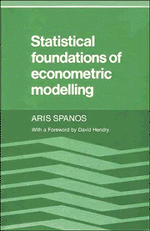Book contents
- Frontmatter
- Contents
- Foreword by David Hendry
- Preface
- Acknowledgements
- List of symbols and abbreviations
- Part I Introduction
- Part II Probability theory
- 3 Probability
- 4 Random variables and probability distributions
- 5 Random vectors and their distributions
- 6 Functions of random variables
- 7 The general notion of expectation
- 8* Stochastic processes
- 9 Limit theorems
- 10* Introduction to asymptotic theory
- Part III Statistical inference
- Part IV The linear regression and related statistical models
- References
- Index
3 - Probability
Published online by Cambridge University Press: 01 June 2011
- Frontmatter
- Contents
- Foreword by David Hendry
- Preface
- Acknowledgements
- List of symbols and abbreviations
- Part I Introduction
- Part II Probability theory
- 3 Probability
- 4 Random variables and probability distributions
- 5 Random vectors and their distributions
- 6 Functions of random variables
- 7 The general notion of expectation
- 8* Stochastic processes
- 9 Limit theorems
- 10* Introduction to asymptotic theory
- Part III Statistical inference
- Part IV The linear regression and related statistical models
- References
- Index
Summary
‘Why do we need probability theory in analysing observed data?’ In the descriptive study of data considered in the previous chapter it was emphasised that the results cannot be generalised outside the observed data under consideration. Any question relating to the population from which the observed data were drawn cannot be answered within the descriptive statistics framework. In order to be able to do that we need the theoretical framework offered by probability theory. In effect probability theory develops a mathematical model which provides the logical foundation of statistical inference procedures for analysing observed data.
In developing a mathematical model we must first identify the important features, relations and entities in the real world phenomena and then devise the concepts and choose the assumptions with which to project a generalised description of these phenomena; an idealised picture of these phenomena. The model as a consistent mathematical system has a ‘life of its own’ and can be analysed and studied without direct reference to real world phenomena. Moreover, by definition a model should not be judged as ‘true’ or ‘false’, because we have no means of making such judgments (see Chapter 26). A model can only be judged as a ‘good’ or ‘better’ approximation to the ‘reality’ it purports to explain if it enables us to come to grips with the phenomena in question. That is, whether in studying the model's behaviour the patterns and results revealed can help us identify and understand the real phenomena within the theory's intended scope.
Information
- Type
- Chapter
- Information
- Statistical Foundations of Econometric Modelling , pp. 33 - 46Publisher: Cambridge University PressPrint publication year: 1986
